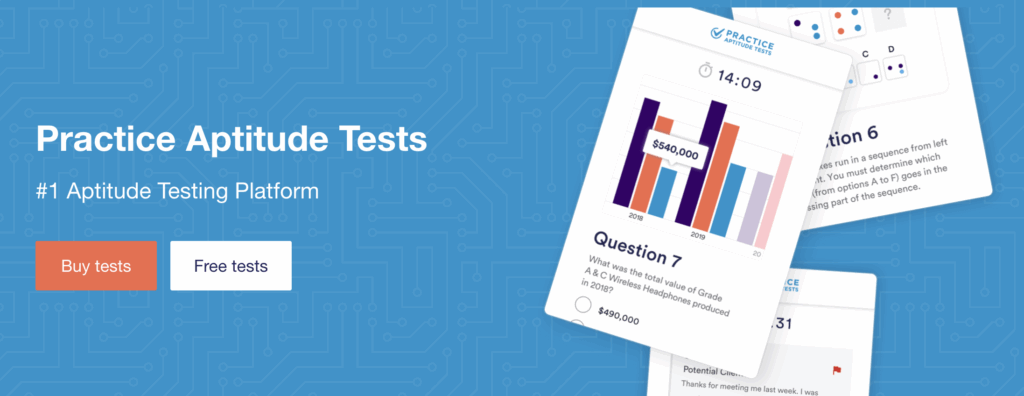Aptitude tests are short, standardised assessments that measure how well you solve problems, reason logically, and use information under time pressure. Employers use them to compare candidates objectively and predict job performance. Practicing common formats and timed tests gives you a real advantage.
Table of Contents
Why do employers use aptitude tests?
Employers use aptitude (psychometric) tests to screen large applicant pools, check job-relevant skills, and reduce bias by measuring ability in a standardised way. Tests can help recruiters decide who moves to interviews and which candidates are most likely to succeed in a role.
They are especially common in graduate programmes and technical jobs, but smaller employers may also use them.
What types of aptitude test questions should I expect?
Here are the most common formats:
- Verbal reasoning — read a passage and answer comprehension or inference questions.
- Numerical reasoning — interpret charts, ratios, and percentages, or do quick calculations.
- Abstract reasoning — spot patterns in shapes or sequences.
- Situational judgement tests (SJTs) — pick the most appropriate workplace response.
- Mechanical or spatial reasoning — often used in engineering or technical roles.
👉 To see how they look, try free sample aptitude test questions from professional test providers.

How can I practice and prepare for aptitude tests?
Preparation is key. Here’s a simple routine:
- Take timed mock tests — try official SHL practice questions to get used to the format.
- Brush up on basics — revise high-school math and grammar. For written skills, review our guide on how to write a CV in Uganda.
- Practice test strategy — skip tough items and return later to save time.
- Simulate real conditions — work in a quiet space, no phone, strict timer (just like in the test).
- Record and review — learn from mistakes and repeat targeted practice.
For official advice, GOV.UK also offers online test preparation guidance
Tips for doing well on test day
- Arrive early and stay calm — avoid last-minute stress.
- Read instructions carefully — many candidates lose marks by rushing.
- Manage your time — don’t dwell on a single hard question.
- Guess smartly if there’s no penalty for wrong answers.
- Stay confident — your mindset can improve accuracy.
After tests, continue preparing for the next step with our interview questions and answers guide
💡 Remember: aptitude tests are designed to be challenging, but staying calm and focused gives you the best chance of success.
TL;DR — Quick takeaways
- Aptitude tests measure reasoning, numeracy, comprehension, and judgement.
- Employers use them to screen and compare applicants objectively.
- Practice timed tests, review basics, and simulate real conditions.
- Success comes from preparation and calm test-day strategy.
FAQ
How long do aptitude tests usually take?
Most last between 20–60 minutes depending on the type.
Can I fail an aptitude test?
Some are diagnostic, but many are scored against a required threshold — scoring below means you don’t progress.
Are aptitude tests fair?
When professionally designed, they are standardised and aim to reduce hiring bias.
Where can I find jobs that require aptitude tests?
Check the latest job listings in Uganda to see which employers include them in recruitment.
Final word
Aptitude tests may seem intimidating at first, but with practice and the right strategies, they can become an opportunity to shine. Build a prep routine, practise under time limits, and apply smart techniques on test day — and you’ll be ready for your next career move.
For more career growth tips, explore our guides on making your CV ATS-friendly or browse new opportunities on BrighterMonday Uganda.





